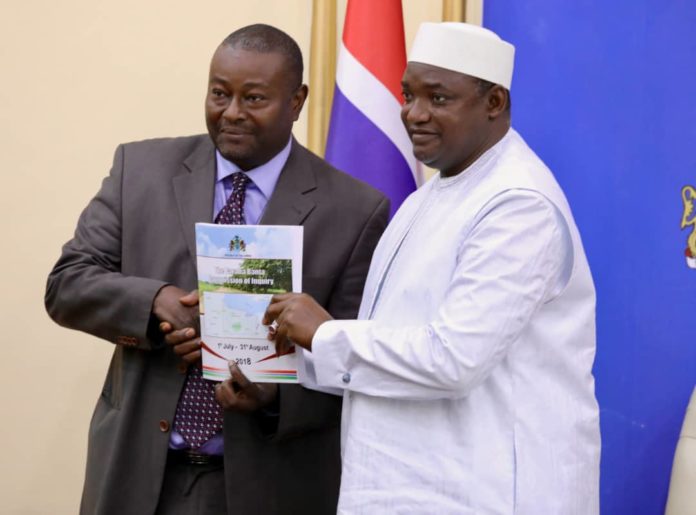By Awa B. Bah
The Faraba Banta Commission on Monday 17 September 2018 handed over their report to the President, Adama Barrow at a handing over ceremony held at statehouse in Banjul. It could be recalled the President, Adama Barrow set up a five person commission of enquiry to look into the tragic event that occurred in Faraba Banta on June 18, 2018, leading to the loss of lives, destruction of properties and injuries after civilians clashed with paramilitary personnel.
Furthermore, on the 1 July 2018, an independent commission of inquiry was instituted led by Mr Emmanuel Daniel Joof as Chairperson, Neneh MC Cham, Abdoulie Colley, Yusupha Jallow, Omar Cham and Kombeh Njie. They were sworn in on 5 July 2018.
Their tasks were to specifically investigate and report on the circumstances that led to the standoff between the villagers of Faraba Banta and the PIU personnel; the circumstances that led to the death and injuries, and to look into who may have ordered the shootings, who carried out the shootings, who were responsible for the destruction of properties and to further provide recommendations. The recommendations were to be centered on how to prevent future recurrence of the Faraba Banta incident, and give recommendation on improving police duties and control.
Emmanuel Daniel Joof in his synopsis of the methodology employed by the Commission in reaching its findings, said they conducted site visits to Faraba Banta on the 29 June following their appointment as Commissioners. This visit he said was just a familiarisation tour and paid their condolences to the bereaved families. Upon their swearing in, he said the Commissioners conducted visits to the sand mining areas, the homes and properties that were destroyed; and conducted sittings in Faraba Banta on three consecutive occasions. The commissioners he said also visited mining sites, gardens, rice fields, which were part of the issues. He said their secretariat was at the Atlantic hotel where public sittings were held.
He noted that a total of eighty-five testimonies were heard, mainly of people from Faraba Banta who had knowledge of what had happened. The testimonies of Julakay he said were also recorded, the PIU officers who were stationed there and those who were deployed there on that day were also heard. Joof said that the police top command was also engaged including the former and current IGP, operation commander, PIU top officials, the Geological Department as they are the ones that issued licence to Julakay. He said the National Environment agency and expert witnesses were also engaged as the commissioners felt it important the report will be informed by their expert knowledge.
He said that two prone areas were also visited, that is, Sanyang and Gunjur where sand mining took place so as to give proper recommendations as there were incidents relating to factories of fish meals. All stakeholders he said were engaged, from the village head, the VDC and villagers, committee members, youth and women groups, kabilos. He said that the pathologist who did the postmortem were also engaged as well as the Coroner’s report on the incident as well as medical documents of those injured.
The report he said was arrived at after listening to the testimonies of many and interviewing stakeholders as well as expert witnesses. He expressed gratitude to the people of Faraba Banta who showed cooperation to the commissioners by appearing to give their testimonies of the events that led to the standoff and the accounts on that fateful day. He stressed that the findings and recommendations in the report will be available and essential to effect the necessary changes to avoid reoccurrences of such incidences.
The Minister of Justice noted that a preliminary review of the report indicates a catalogue of errors ranging from lack of consultations, mistrust, and lack of coordination among all stakeholders. The report he highlights touches on fundamental issues of the proper roles and responsibilities of government departments such as NEA, Geological Department, and state institutions including the National Assembly Select Committee on The Environment. He added that the report will shed light on a number of burning issues pointing the way to a more stable Gambia.
The President he said will review and publish the report in due course with a statement on actions to be taken in accordance of the 1997 Constitution.
The President in receiving the report said his government recognises the importance of holding and applying the laws of the land. He noted that they have the responsibility to follow the required procedures of the report. He commended the commissioners for their commitment to serve The Gambia when their services were needed most. He reiterated that The Gambia is going through an important period in which our resolve for democracy, good governance, human rights and national development continue to be tested. In the process of following procedures, Barrow said they cannot lose sight of the process of establishing accurate facts and that the truth in all circumstances in order to progress peacefully.

















